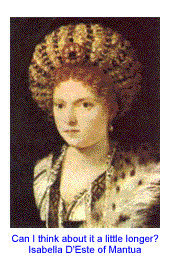|
A bubbe's meiseh your grandmother most certainly wouldn't have spun
By Sheldon Kirshner
At 72, Jacqueline Park, a grandmother, considers herself a first-time
author. "It feels wonderful," exulted Park, whose novel, The Secret Book
of Grazia dei Ross, was recently published by Simon and Schuster.
The tome spins the tale of an Italian Jew who is suspended between two
As a professor of dramatic writing at New York University's film
school, Park was entitled to free courses. Studying art history, she
became fascinated with early Renaissance painting. This, in turn,
prompted her to learn Italian and delve into the chronicles of Italian
Jewry.
Reading Shlomo Simonsohn's History of Jews of Mantua, Park stumbled
across an intriguing footnote suggesting a forbidden romance between
Pacienza Pontremoli, a Jew, and his Catholic love. Piqued by curiosity,
Park went to the New York Public Library to investigate. There, on
microfilm, she found two defunct Italian-Jewish journals which had
printed the correspondence between Pontremoli and Isabella D'Este, the
daughter of a Catholic aristocrat.
D'Este urged Pontremoli to give up his foolish attachment to Judaism and
convert to Christianity so that she could wed the young man who so
adored him. Pontremoli, weak and confused, wavered.
"At that point," Park said, "the curtain descends and Pacienza
disappears into the mist of history."
As this material simmered in her imagination, Park decided it was the
stuff of a grand, sweeping novel. In the 1970s Park had written a
mystery novel based on one of her TV scripts. She immediately plunged
into the task. It took her 10 years to complete the manuscript. Two more
years elapsed before it was finally edited and ready for publication.
Long before embarking on The Secret Book of Grazia dei Rossi, Park
produced scripts for the National Film Board of Canada and dramas for
the Canadian Broadcasting Corporation. She hesitated, however, to
attempt an original, full-blown novel.
"I didn't have the nerve. It seemed so presumptuous of me to tackle that
form," she confessed.
Writing during sabbaticals and vacations, Park learned that the crafting
of a novel is a process of self-revelation. "You don't really know what
it's all about until you reach the end. A novel has a life of it's own."
Remarkably enough, Parks own life mirrors this credo. "I never had
career plans," she explained. "I went where the wind took me." An
unusually bright student who graduated at 19 with an honors BA degree in
economics from the University of Manitoba (Canada), she went on to take
her Masters degree in economic history at the University of Toronto. "I
did it to widen my knowledge," said Park, who was then a Marxist.
Leaving Canada in 1960, she immigrated to America, where she met her
husband, Ben Park, a TV producer, with whom she had two daughters.
Later, she began teaching at NYU, where she is now a professor emerita.
For Park, The Secret Life of Grazia dei Rossi, coupled with her
commitment to promote the book, and her intention to write two more
Renaissance-era novels, comes at a fortuitous juncture. "My husband died
last year, and there was a hole in my life. Now I have a good reason to
get up in the morning."
The novel has also brought her closer to her Jewish roots. "It took me
60 years to appreciate that heritage," said Park, who founded a Torah
study group while composing her novel.
 cultures. Set during the Renaissance, the novel -- which unfolds against
the backdrop of religious intolerance, war, papal politics and family
strife -- was inspired by two letters Park found in a library.
cultures. Set during the Renaissance, the novel -- which unfolds against
the backdrop of religious intolerance, war, papal politics and family
strife -- was inspired by two letters Park found in a library.
Sheldon Kirshner is a columnist based at The Canadian Jewish News.